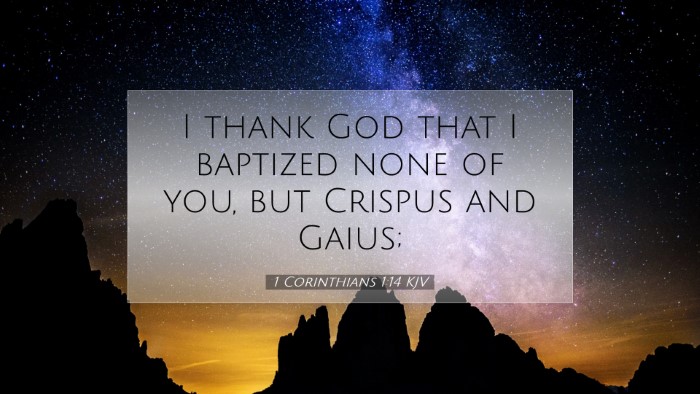Commentary on 1 Corinthians 1:14
Verse Reference: 1 Corinthians 1:14 (KJV) - "I thank God that I baptized none of you, but Crispus and Gaius."
Introduction
This verse is part of a larger discourse where Paul addresses divisions within the Corinthian church. It emphasizes his gratitude for having limited involvement in the act of baptism among the Corinthians, signifying a greater focus on the message of the gospel rather than on personal allegiances.
Background Context
Corinth was a city marked by diversity and moral laxity. The church was composed of individuals from various backgrounds, leading to the formation of cliques based on the leaders who baptized them. Paul, realizing the danger of this loyalty to human leaders, seeks to redirect their focus towards Christ alone.
Analysis of Key Components
1. The Act of Thanksgiving
Paul begins with "I thank God," which reflects his spiritual perspective. This marks his acknowledgment that even in a difficult situation, there is reason to praise God. It shows Paul's reliance on divine providence.
2. The Significance of Baptism
Baptism, as an outward sign of inward faith, is significant in the Christian faith. However, Paul stresses that it is not the act of baptism itself that saves, but the faith in Christ it represents. His words indicate that the act of baptizing had become a source of contention and division in the church.
Commentary Insights
- Matthew Henry: Henry posits that Paul's expression of thanks underscores the importance of spiritual integrity over mere ritualism. He emphasizes that Paul wishes to detach believers from allegiance to any man.
- Albert Barnes: Barnes indicates that the church had begun to idolize the act of baptism, treating it as paramount over the preaching of the gospel. Paul’s comment serves to clarify the true purpose of baptism as a means of faith and commitment to Christ rather than a badge of sectarianism.
- Adam Clarke: Clarke discusses the implications of Paul's limited baptizing. He notes that while baptizing is an important sacrament, it is not central to the salvation message. Paul’s focus remains on the word of God, which should unite rather than divide.
3. Crispus and Gaius
Paul specifically mentions Crispus and Gaius as the only individuals he baptized. This selective mention suggests the relationship he had with them and serves as an example of his ministry focus. Paul desires to show that his relationship with these individuals is rooted in faith rather than an ownership claim that might lead to division.
- Crispus: The chief ruler of the synagogue, Crispus’s conversion exemplifies the impact of Paul’s ministry among the Jews in Corinth.
- Gaius: Often identified as a host to Paul, Gaius represents the Gentile audience that responded to his ministry efforts, highlighting the grace of God’s invitation to both Jews and Gentiles.
Lessons for the Church Today
The divisions within the Corinthian church serve as a pertinent reminder for modern congregations. In a world where personalities and charismatic leaders can often overshadow the gospel message, Paul’s words encourage believers to concentrate on Christ rather than on human leaders or movements.
Unity in Christ
A central theme in this passage is unity. The call of the church is to be united in Christ, transcending personal preferences, biases, and loyalties. Each believer is a part of the body of Christ, contributing to its function and mission.
Importance of Preaching over Ritual
Paul's emphasis on the gospel message rather than the act of baptism underlines a significant theological premise: salvation comes through faith in Christ and not through the act of ceremonial rites. This places preaching as a priority and encourages believers to uphold the message of Christ as the core of their faith.
Conclusion
1 Corinthians 1:14 encapsulates essential teachings that challenge Christians to reflect on their allegiance and the essence of their faith. It is a call to keep the focus on Christ and the power of the gospel rather than on human leaders and accolades. Paul’s thankfulness serves as a poignant reminder of the importance of spiritual focus amid the challenges and divisions encountered in the church.


